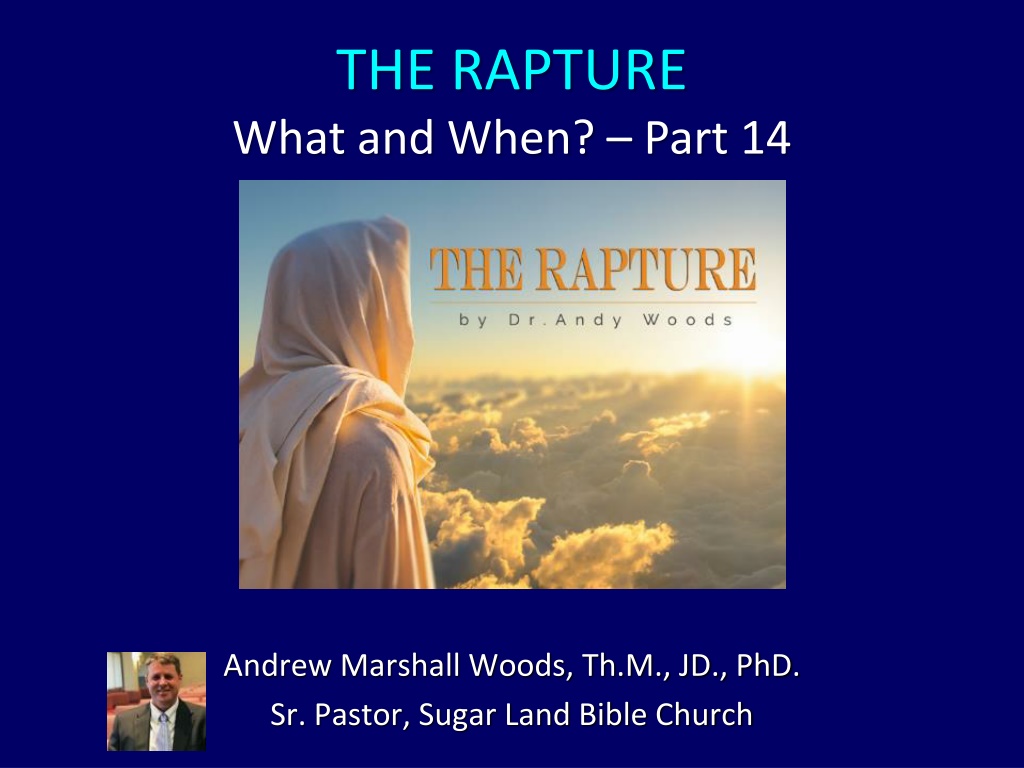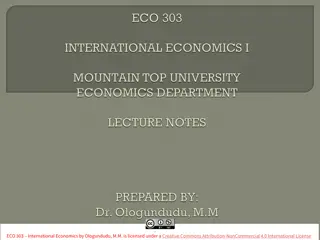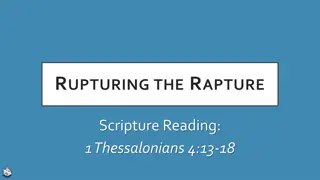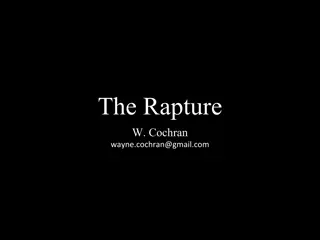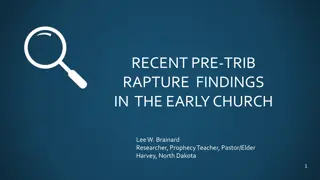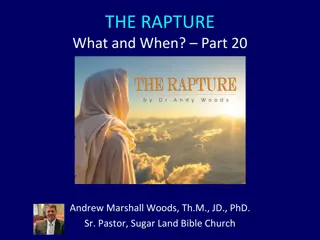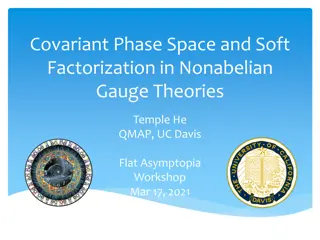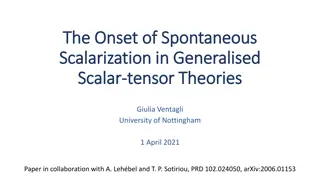Understanding the Rapture: What, When, and Theories Explored
Delve into the concept of the Rapture, exploring its significance, timing in relation to the Tribulation period, and arguments for the Pre-Tribulation view based on biblical references and prophecies. Learn about different theories such as Pre-Tribulation, Mid-Tribulation, Post-Tribulation, Pre-Wrath, and Partial Rapture, as well as key passages supporting the Pre-Tribulation case like John 14:1-4 and Revelation 3:10.
Download Presentation

Please find below an Image/Link to download the presentation.
The content on the website is provided AS IS for your information and personal use only. It may not be sold, licensed, or shared on other websites without obtaining consent from the author. Download presentation by click this link. If you encounter any issues during the download, it is possible that the publisher has removed the file from their server.
E N D
Presentation Transcript
THE RAPTURE What and When? Part 14 Andrew Marshall Woods, Th.M., JD., PhD. Sr. Pastor, Sugar Land Bible Church
What is the Rapture? 1. An important doctrine 2. Distinct from the Second Advent 3. Catching away of all living believers (1 Thess 4:17) 4. Reunion (1 Thess 4:14-16) 5. Resurrection (1 Cor 15:50-54) 6. Exemption from death (1 Cor 15:51, 54-56) 7. Instantaneous (1 Cor 15:52) 8. Mystery (1 Cor 15:51) 9. Imminent (1 Cor 15:51; 1 Thess 4:15) 10.Traditional doctrine now being recovered
When Will the Rapture Take Place Relative to the Tribulation Period? Pre-tribulation rapture theory Mid-tribulation rapture theory Post-tribulation rapture theory Pre-wrath rapture theory Partial rapture theory
When is the Rapture? 7 Arguments Favoring the Pre-Tribulation View 1. Tribulation's purpose concerns Israel (Jer 30:7; Dan 9:24) 2. No biblical reference to the church on earth during the Tribulation period (Rev 4-22) 3. Church is promised an exemption from divine wrath (1 Thess 1:10; 5:9; Rom 5:9; Rev 3:10; 6:17) 4. Rapture is imminent (1 Cor 15:51; 1 Thess 4:15) 5. Rapture is a comfort (1 Thess 4:18) 6. Antichrist cannot come to power until the restrainer is removed (2 Thess 2:6-7) 7. Symbolic parallels (2 Peter 2:5-9)
Strengthening the Pre-Tribulation Case 1. John 14:1-4 2. Revelation 3:10 3. First Thessalonians 4 5 4. Second Thessalonians 2:3a 5. Matthew 24 25
Strengthening the Pre-Tribulation Case 1. John 14:1-4 2. Revelation 3:10 3. First Thessalonians 4 5 4. Second Thessalonians 2:3a 5. Matthew 24 25
John 14:14 1 Do not let your heart be troubled; believe in God, believe also in Me. 2 In My Father s house are many dwelling places; if it were not so, I would have told you; for I go to prepare a place for you. 3 If I go and prepare a place for you, I will come again and receive you to Myself, that where I am, there you may be also. 4 And you know the way where I am going.
Preview (John 14:1-4) I. Preliminary reasons John 14:1 4 "Do not let your heart be troubled; believe believe also in Me. In My Father's house dwelling places; if it were not so, I would have told you; for I go to prepare a place for you. If I go and prepare a place for you, I will come again and receive you to Myself, that where I am, there you may be also. And you know the way where I am going." in God, II. Exegesis of John 14:1-4 are many III. Answering the non-rapture arguments
Preview (John 14:1-4) I. Preliminary reasons John 14:1 4 "Do not let your heart be troubled; believe believe also in Me. In My Father's house dwelling places; if it were not so, I would have told you; for I go to prepare a place for you. If I go and prepare a place for you, I will come again and receive you to Myself, that where I am, there you may be also. And you know the way where I am going." in God, II. Exegesis of John 14:1-4 are many III. Answering the non-rapture arguments
I. Preliminary Reasons A. Significance of the Upper Room Discourse (John 13 17) B. Eschatological flavor of the Upper Room Discourse C. Early church fathers D. Jewish marriage analogy E. Parallels with other rapture texts
Preview (John 14:1-4) I. Preliminary reasons John 14:1 4 "Do not let your heart be troubled; believe believe also in Me. In My Father's house dwelling places; if it were not so, I would have told you; for I go to prepare a place for you. If I go and prepare a place for you, I will come again and receive you to Myself, that where I am, there you may be also. And you know the way where I am going." in God, II. Exegesis of John 14:1-4 are many III. Answering the non-rapture arguments
Conclusion 1. Christ would return through His Ascension to His Father's heavenly abode. 2. He would then prepare temporary dwellings for His disciples. 3. He would return for His disciples in the future. 4. His return would be just as personal as was His First Coming and Ascension. 5. He would physically take believers to be with Him by spatially drawing them to Himself.
Conclusion 7. The purpose of this event is so that believers could dwell in their prepared, temporal, heavenly places and be with Christ where He is. 8. This information would serve as a comfort to the disciples who were announcement over His soon departure (John 13:1). troubled over the 9. Christ unfolded the reality of this event for the purpose of comforting His disciples (John 14:1).
Arno Gaebelein New Mystery Truth But here in John 14 the Lord gives a new and unique revelation; He speaks of something which no prophet had promised, or even could promise. Where is it written that this Messiah would come and instead of gathering His saints into an earthly Jerusalem, would take them to the Father's house, to the very place where He is? It is something new. Arno C. Gaebelein, The Gospel of John, 268.
Preview (John 14:1-4) I. Preliminary reasons John 14:1 4 "Do not let your heart be troubled; believe believe also in Me. In My Father's house dwelling places; if it were not so, I would have told you; for I go to prepare a place for you. If I go and prepare a place for you, I will come again and receive you to Myself, that where I am, there you may be also. And you know the way where I am going." in God, II. Exegesis of John 14:1-4 are many III. Answering the non- rapture arguments
III. Inadequate Alternatives A. Believer's death B. Believer's salvation C. Christ s resurrection D. Coming of the Spirit on Pentecost (Acts 2) E. Non-pretribulational rapture
III. Inadequate Alternatives A. Believer's death B. Believer's salvation C. Christ s resurrection D. Coming of the Spirit on Pentecost (Acts 2) E. Non-pretribulational rapture
III. Inadequate Alternatives A. Believer's death 1. Again (palin) = 1x 2. Angels take deceased believers to heaven (Luke 16:22) 3. Christ remains in heaven when believers die (Acts 7:56) 4. Believers go to the lord upon death (2 Cor 5:8)
III. Inadequate Alternatives A. Believer's death 1. Again (palin) = 1x 2. Angels take deceased believers to heaven (Luke 16:22) 3. Christ remains in heaven when believers die (Acts 7:56) 4. Believers go to the lord upon death (2 Cor 5:8)
II. Exegesis of John 14:1-4 vs. 3 I will come again Again (palin) "The coming again is the counterpart of the going away; visibly Jesus ascends, visibly he returns, Acts 1:9-11. (Lenski, p. 974) "to repetition in the same (or similar) manner, again, once more, anew of someth. a pers. has already done. (BDAG, p. 752)
III. Inadequate Alternatives A. Believer's death 1. Again (palin) = 1x 2. Angels take deceased believers to heaven (Luke 16:22) 3. Christ remains in heaven when believers die (Acts 7:56) 4. Believers go to the lord upon death (2 Cor 5:8)
III. Inadequate Alternatives A. Believer's death 1. Again (palin) = 1x 2. Angels take deceased believers to heaven (Luke 16:22) 3. Christ remains in heaven when believers die (Acts 7:56) 4. Believers go to the lord upon death (2 Cor 5:8)
III. Inadequate Alternatives A. Believer's death 1. Again (palin) = 1x 2. Angels take deceased believers to heaven (Luke 16:22) 3. Christ remains in heaven when believers die (Acts 7:56) 4. Believers go to the lord upon death (2 Cor 5:8)
III. Inadequate Alternatives A. Believer's death B. Believer's salvation C. Christ s resurrection D. Coming of the Spirit on Pentecost (Acts 2) E. Non-pretribulational rapture
III. Inadequate Alternatives B. Believer's Salvation 1. Again (palin) = 1x 2. Allegorization of localized language describing a heavenly- Father s house , dwelling places , a place , where I am , where I go
III. Inadequate Alternatives B. Believer's Salvation 1. Again (palin) = 1x 2. Allegorization of localized language describing a heavenly- Father s house , dwelling places , a place , where I am , where I go
II. Exegesis of John 14:1-4 vs. 3 I will come again Again (palin) "The coming again is the counterpart of the going away; visibly Jesus ascends, visibly he returns, Acts 1:9-11. (Lenski, p. 974) "to repetition in the same (or similar) manner, again, once more, anew of someth. a pers. has already done. (BDAG, p. 752)
III. Inadequate Alternatives B. Believer's Salvation 1. Again (palin) = 1x 2. Allegorization of localized language describing a heavenly- Father s house , dwelling places , a place , where I am , where I go
III. Inadequate Alternatives A. Believer's death B. Believer's salvation C. Christ s resurrection D. Coming of the Spirit on Pentecost (Acts 2) E. Non-pretribulational rapture
III. Inadequate Alternatives C. Christ s resurrection (John 14:18-20; 20:19, 26; 21:1) 1. Christ comes after the Ascension ( I go ) rather than before 2. Again (palin) = like His first coming which was from heaven rather than out of a tomb 3. To (pros) = No spatial movement involved with the resurrected Christ coming to His disciples
III. Inadequate Alternatives C. Christ s resurrection (John 14:18-20; 20:19, 26; 21:1) 1. Christ comes after the Ascension ( I go ) rather than before 2. Again (palin) = like His first coming which was from heaven rather than out of a tomb 3. To (pros) = No spatial movement involved with the resurrected Christ coming to His disciples
II. Exegesis of John 14:1-4 vs. 2 In My Father's house are many dwelling places I go to prepare a place for you. I go Jesus came from (John 16:28; 17:5) and is going back to heaven (John 13:12; 14:12; 16:28) Poreuomai= Ascension (Acts 1:10-11; 1 Pet 3:22)
John 14:14 1 Do not let your heart be troubled; believe in God, believe also in Me. 2 In My Father s house are many dwelling places; if it were not so, I would have told you; for I go to prepare a place for you. 3 IfI go and prepare a place for you, I will come again and receive you to Myself, that where I am, there you may be also. 4 And you know the way where I am going.
III. Inadequate Alternatives C. Christ s resurrection (John 14:18-20; 20:19, 26; 21:1) 1. Christ comes after the Ascension ( I go ) rather than before 2. Again (palin) = like His first coming which was from heaven rather than out of a tomb 3. To (pros) = No spatial movement involved with the resurrected Christ coming to His disciples
II. Exegesis of John 14:1-4 vs. 3 I will come again Again (palin) "The coming again is the counterpart of the going away; visibly Jesus ascends, visibly he returns, Acts 1:9-11. (Lenski, p. 974) to repetition in the same (or similar) manner, again, once more, anew of someth. a pers. has already done. (BDAG, p. 752)
III. Inadequate Alternatives C. Christ s resurrection (John 14:18-20; 20:19, 26; 21:1) 1. Christ comes after the Ascension ( I go ) rather than before 2. Again (palin) = like His first coming which was from heaven rather than out of a tomb 3. To (pros) = No spatial movement involved with the resurrected Christ coming to His disciples
II. Exegesis of John 14:1-4 vs. 3 Andreceive you tomyself Receive (paralamban ): "to take into close association, take (to oneself), take with/along...I will take you to myself J14:3 ...with me to my home. (BDAG, p. 767) To (pros): "pros with the Accusative...This is very common and denotes movement 'towards.'...Spatially, 'to or towards someone or something,' primarily with an intransitive or transitive verb expressing movement. (TDNT, p. 721). Summary: Christ's return to spatially remove believers and to take them to be with Him
III. Inadequate Alternatives A. Believer's death B. Believer's salvation C. Christ s resurrection D. Coming of the Spirit on Pentecost (Acts 2) E. Non-pretribulational rapture
The NET Bible New English Translation, Beta ed. (Biblical Studies Press, 2001), 1985-66.. If in the imagery of the Fourth Gospel the phrase in my Father s house is ultimately a reference to Jesus body, the relationship of to suggests the permanent relationship of the believer to Jesus and the Father as an adopted son who remains in the household forever. In this case the dwellingplace is in Jesus himself, where he is, whether in heaven or on earth. The statement in v. 3, I will come again and receive you to myself, then refers not just to the parousia, but also to Jesus post-resurrection return to the disciples in his glorified state, when by virtue of his death on their behalf they may enter into union with him and with the Father as adopted sons.
The NET Bible New English Translation, Beta ed. (Biblical Studies Press, 2001), 1985-66.. Needless to say, this bears numerous similarities to Pauline theology, especially the concepts of adoption as sons and being inChrist which are prominent in passages like Eph 1. It is also important to note, however, the emphasis in the Fourth Gospel itself on the present reality of eternal life (John 5:24; 7:38-39, etc.) and the possibility of worshiping the Father in the Spirit and in truth (John 4:21-24) in the present age. There is a sense in which it is possible to say that the future reality is present now.
DTS Doctrinal Statement Article XVIII The Blessed Hope We believe that, according to the Word of God, the next great event in the fulfillment of prophecy will be the coming of the Lord in the air to receive to Himself into heaven both His own who are alive and remain unto His coming, and also all who have fallen asleep in Jesus, and that this event is the blessed hope set before us in the Scripture, and for this we should be constantly looking (John 14:1 3; 1 Cor. 15:51 52; Phil. 3:20; 1 Thess. 4:13 18; Titus 2:11 14).
III. Inadequate Alternatives D. Coming of the Spirit in Acts 2 1. Again (palin) - like His first coming yet Acts 2 was not a bodily 2. To (pros) - No spatial movement involved with the Spirit coming to the church 3. Receive you to Myself - The Holy Spirit did not receive believers in Acts 2 but believers received the Holy Spirit (John 20:22; Acts 2:38; 8:15-17).
III. Inadequate Alternatives D. Coming of the Spirit in Acts 2 1. Again (palin) - like His first coming yet Acts 2 was not a bodily 2. To (pros) - No spatial movement involved with the Spirit coming to the church 3. Receive you to Myself - The Holy Spirit did not receive believers in Acts 2 but believers received the Holy Spirit (John 20:22; Acts 2:38; 8:15-17).
II. Exegesis of John 14:1-4 vs. 3 I will come again Again (palin) "The coming again is the counterpart of the going away; visibly Jesus ascends, visibly he returns, Acts 1:9-11. (Lenski, p. 974) "to repetition in the same (or similar) manner, again, once more, anew of someth. a pers. has already done. (BDAG, p. 752)
III. Inadequate Alternatives D. Coming of the Spirit in Acts 2 1. Again (palin) - like His first coming yet Acts 2 was not a bodily 2. To (pros) - No spatial movement involved with the Spirit coming to the church 3. Receive you to Myself - The Holy Spirit did not receive believers in Acts 2 but believers received the Holy Spirit (John 20:22; Acts 2:38; 8:15-17).
II. Exegesis of John 14:1-4 vs. 3 Andreceive you tomyself Receive (paralamban ): "to take into close association, take (to oneself), take with/along...I will take you to myself J14:3 ...with me to my home. (BDAG, p. 767) To (pros): "pros with the Accusative...This is very common and denotes movement 'towards.'...Spatially, 'to or towards someone or something,' primarily with an intransitive or transitive verb expressing movement. (TDNT, p. 721). Summary: Christ's return to spatially remove believers and to take them to be with Him
III. Inadequate Alternatives D. Coming of the Spirit in Acts 2 1. Again (palin) - like His first coming yet Acts 2 was not a bodily 2. To (pros) - No spatial movement involved with the Spirit coming to the church 3. Receive you to Myself - The Holy Spirit did not receive believers in Acts 2 but believers received the Holy Spirit (John 20:22; Acts 2:38; 8:15-17).
III. Inadequate Alternatives A. Believer's death B. Believer's salvation C. Christ s resurrection D. Coming of the Spirit on Pentecost (Acts 2) E. Non-pretribulational rapture
